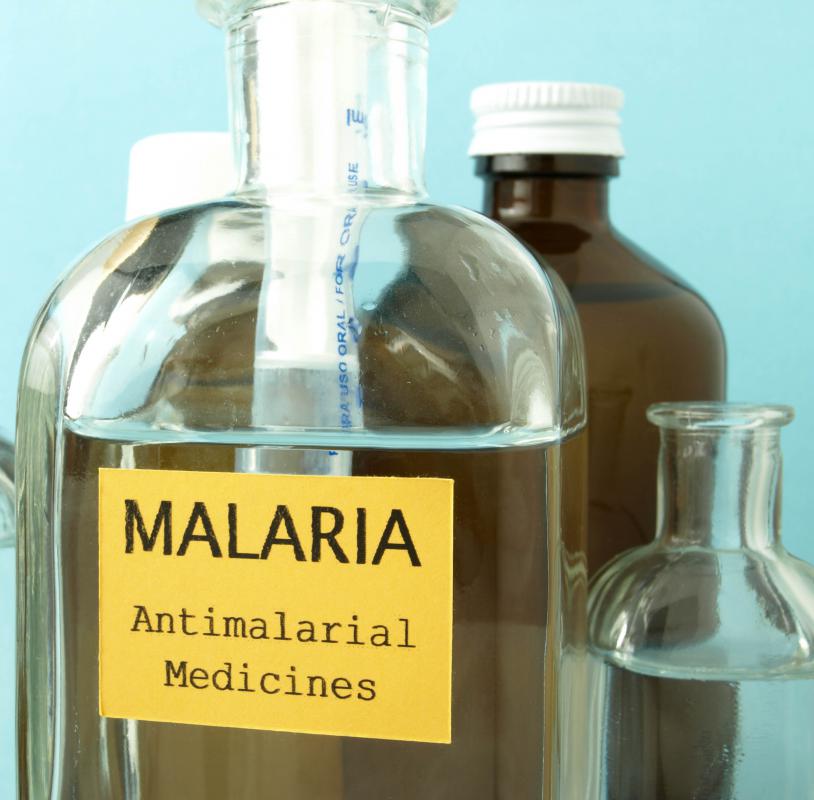At WiseGEEK, we're committed to delivering accurate, trustworthy information. Our expert-authored content is rigorously fact-checked and sourced from credible authorities. Discover how we uphold the highest standards in providing you with reliable knowledge.
What is the Plasmodium Life Cycle?
Plasmodium is a genus of protozoan parasites, many of which are known to cause malaria in humans. Parasites are transmitted between human hosts by female mosquitoes of the genus Anopheles. Plasmodium cannot survive outside of a mosquito or human, so the entire plasmodium life cycle is carried out during the process of transmission and infection. There are several somewhat complex stages in the life cycle of plasmodium, though researchers have been able to accurately trace the pathways and mechanisms parasites use to spawn, mature, thrive, and replicate.
The plasmodium life cycle begins when new cells, called sporozoites, are picked up by a mosquito when it bites an infected person. Sporozoites lie dormant in the saliva of the mosquito until it bites another host. Immature parasites travel in the bloodstream of a human to the liver, where they attach to cells called hepatocytes. Over the course of about nine days, sporozoites mature into their juvenile form called merozoites. It is common for several thousand merozoites to form within only a few liver cells.

Groups of merozoites usually break free from the liver between nine and 20 days after the initial infection. They then invade red blood cells called erythrocytes and use the cells' energy sources to drive asexual reproduction. In about two to four days, infected erythrocytes break open and plasmodium parasites quickly spread to other host cells. Parasites constantly replicate in the bloodstream and new spores can again be picked up by mosquitoes, thus continuing the plasmodium life cycle.

People who are infected with malaria can experience a number of devastating side effects. Anemia is common as parasites cause red blood cells to rupture. Fever, nausea, vomiting, and muscle pain become prevalent as plasmodium spreads throughout the bloodstream. In severe cases, people can experience whole body convulsions, extreme fatigue, or even comas. Lung, liver, or kidney failure is possible if plasmodium spores overtake the majority of red blood cells in the body.

Malaria is often deadly without prompt medical care. Thanks to recent advancements in medicine and new, deeper understandings of the plasmodium life cycle, specialty doctors are usually able to combat the parasites in the early stages of infection. Anti-malarial medications such as chloroquine are generally effective at boosting the immune system's defenses and preventing plasmodium reproduction in the bloodstream. In addition, doctors strongly urge world travelers to receive chloroquine injections before embarking on trips as a form of preventive medicine.
AS FEATURED ON:
AS FEATURED ON:















Discussion Comments
It is important for anyone traveling outside of the United States, especially traveling into countries at high risk for malaria, to get chloroquine injections by a licensed doctor, as this is a preventative medicine against malaria.
We should be overly cautious, than not cautious enough. I would rather have a few bad reactions to preventative medicine than to have even one horrible disease from not getting the proper preventative medicine beforehand.
Before going on a trip out of country, especially to a third world country, we should consult our doctor(s) and let them know where we are going. This way doctors can inform us patients of what they know about the country/city/region, equip us with the proper preventative medicine, and prepare us for the medical dangers of particular locations.
It is important to not only listen to doctor’s, but also write down all vital information. We should also write down our doctor’s information if we do not already have it, like our doctor’s name, telephone number, and/or e-mail address. This information is good to have regardless, but it is especially important when traveling out-of-country.
You may not be able to understand the people’s languages where you travel to, and they may not be able to understand you.
It is always handy to locate a translator and/or basic knowledge of where you are going, what language they speak, and at least some other basic information about the place and/or places you are traveling to.
It has always been a dream of mine to help out in poverty-stricken areas of the world, especially Africa, namely Uganda. I don't know much about that region, a just have a couple friends who are from there, and know that it is heavily populated with people infected with the AIDS virus and are HIV positive.
I also know that a lot of people in Africa fall victim to malaria, and most people try to sleep with a mosquito net to protect them at night.
It is so sad to think malaria is so preventable, at least early on, yet most people die before getting the easy and affordable treatment they need, because they are too poor to get help or know where to go for help.
The plasmodium life cycle seems like such a horrid thing to happen to people who do not have the knowledge and/or the means to prevent the whole life cycle from taking place. I hope and pray that everyone in Africa, and other poverty stricken places, get the education and treatment to stop preventable and curable diseases like Malaria.
Post your comments